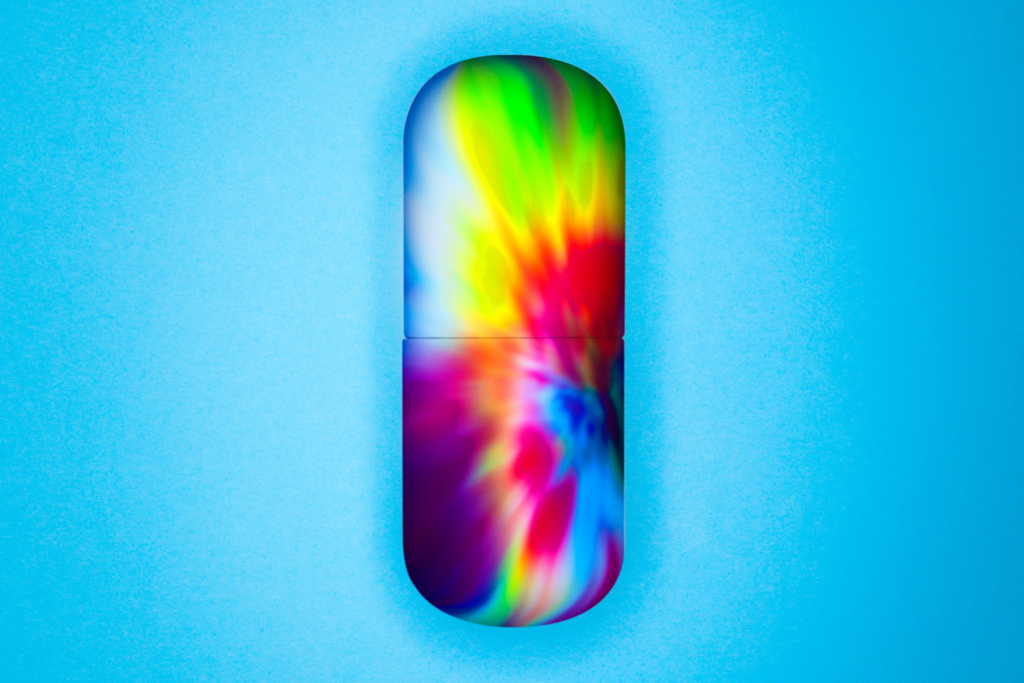You could say the 1970s are alive and well across America. Bell-bottoms are back in fashion (again). Disco hooks have resurfaced in pop hits. And even our collective anxieties feel reminiscent of the Vietnam era: economic instability, political upheaval and pending environmental collapse. Perhaps it’s natural, then, that psychedelics are making big headlines.
In 2022, the buzz surrounding psychedelic compounds, such as MDMA or the psilocybin in magic mushrooms, isn’t centered on the nightlife scene or underground market. Health and mental wellness clinicians are leading the charge—armed with an expanding body of medical research and big-investor money. The value of the psychedelic-related market today is estimated at more than $3 billion, with major biotech and pharmaceutical companies expected to double that figure by 2026 as psychedelic-assisted therapies progress.
One substance, ketamine, is at the forefront of this culture shift. That’s partly because it was first introduced as a prescription anesthetic in the early 1970s during the Vietnam War. Though technically not a psychedelic, the substance has hallucinogenic properties. It quickly started circulating as a club drug, dubbed Special K or simply ‘K.’
More recently, psychiatrists have started using ketamine off-label—that is, for conditions that weren’t targeted in the FDA approval process. Based on preliminary research, mental health providers use smaller doses on patients who struggle with anxiety, depression and other treatment-resistant mental disorders. And some remarkable results are emerging anecdotally and in peer-reviewed journals. “We have seen a phenomenal response,” Monica Robles, a psychiatrist who runs Seaside Oaks Psychiatry in Naples, says.
The psychiatrist of 20-plus years describes her practice as conventional and conservative as far as treatment methodology. So she was skeptical when talk of ketamine and psychedelics began surfacing in her circles several years ago: “I was slow to believe in it,” she says.
She talked to peers in the field, consulted the American Psychiatric Association on the topic and attended multiple conferences. Eventually, one of her patients requested ketamine treatment, and she felt comfortable making a referral to a provider in Fort Myers. The results, combined with her research, convinced her to pursue training.
Last summer, she hired an ICU nurse to administer low-dose ketamine infusions via IV and was up and running with her first client in August. The patient had been in weekly, intensive psychotherapy with Robles for nearly two years, cycling through traditional antidepressants and struggling to function daily. Following the standard protocol of six rounds of ketamine over several weeks, she celebrated six months of remission this spring, keeping a steady job along the way. “It almost brings tears to my eyes to see a response that dramatic,” says Robles, who has since expanded the treatment to many patients.
In the next breath, Robles points to the caveats of a treatment like this in its infancy. Ketamine does not work for everyone. It should not be the first resource for treating anxiety, depression or other mood disorders. No one knows what the long-term effects are. And it doesn’t operate as an isolated tool. “It’s not like a hammer that can hit every nail,” she adds.
But for patients and practitioners alike, the emerging option provides a flicker of hope in a field that hasn’t seen much change in antidepressant drugs for decades. It’s no secret that standbys like Prozac and Zoloft have significant limitations and mixed long-term results, plus a long list of side effects.
The breakthroughs also advance legal changes. Notably, the FDA approved a ketamine-based nasal spray, Spravato, in 2019 as a first-of-its-kind antidepressant. Florida pushed a bill in the statehouse in 2021 to approve more studies related to ketamine- and psychedelic-assisted therapy. And, the state of Oregon legalized psilocybin for psychedelic-assisted therapy in late 2020.
Research in just the past couple years is beginning to offer a peek at how ketamine—and perhaps some psychedelics—might help the brain. One of the most relevant and unique effects appears to be how it induces “long-term plasticity that far outlasts ketamine’s clearance from the body,” Lisa Monteggia, a neuroscientist and professor of pharmacology at Vanderbilt University, says.
In other words, the drug expedites the brain’s ability to reorganize its patterns and form new connections between neurons. That general process can apply to people recovering from a head injury or stroke and might explain why ketamine has shown promising results for patients battling addiction, posttraumatic stress disorder and suicidal ideation. “(It) triggers antidepressant effects within a few hours, but the effect lasts for hours to days, to even more than a week in some patients,” Monteggia says.
While Robles’ clinic focuses on low-dose ketamine treatments to limit disassociation in patients, others promote higher doses, with the goal of achieving a more psychedelic state. “We specialize in the psychedelic protocol,” Charles Patti, chief of education at MY Self Wellness clinic in Bonita Springs, says.
Similar to at Seaside Oaks, patients get a consultation with a licensed psychiatrist, and once approved for ketamine, they receive talk therapy and other support in a series of sessions. But at MY Self Wellness, ketamine is administered through an intramuscular shot, typically in a higher dose. “People are going into a disassociated state, where profound healing experiences are happening,” says Patti, who credits ketamine with saving his life after 20 years of substance abuse.
The clinic also incorporates mindfulness and spiritual components, such as meditation and breathwork, to support the changes needed in the mind. And they create a spa-like setting that Patti describes as, “the farthest thing away from a medical facility.”
Medical experts, including the American Psychiatric Association, generally insist on several safeguards for responsible treatment. Patients should be under the care of a psychiatrist and receive a psychiatric evaluation. Monitoring should take place throughout any infusion treatment. And follow-up care is vital. “When the patient starts feeling better, ‘what do they do with this?’” Robles asks rhetorically. That’s where the opportunity can arise for real change in the person. And for some, ketamine seems to offer the clarity and support to answer that question in profound ways.




